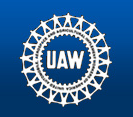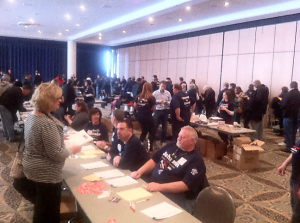In yesterday’s Detroit Free Press I read an article which I posted on Facebook. There was an interesting story about the United Auto Workers (@UAW) growing their membership in the South. In the now infamous Volkswagen experiment, although it did not work, the failure was not as a result of the effort of the UAW and their organizers but more as a result of the efforts of those in politics who are threatened by what the UAW represents. And what do they represent? What they represent is freedom. What they represent is quality of life. What they represent is a minimum standard of living. What they really represent, at a very basic level, is an idea; an idea that we all grew up on which was, quite simply, that we all should have equal access to jobs and that those jobs, where we are working full-time and producing for our employer who is profitable, should be properly compensated and that we should work in a workplace that, indeed, is safe and secure.
 Why this is so hard for some to comprehend is really so outside my belief system that I do end up just shaking my head in wonderment. Why? Because why would anybody have a problem with all of us doing okay or better than okay? We’re not talking about people getting wealthier, folks. What were talking about is people being able to survive, to provide for their families, to put a roof over their head, and, God willing, be able to send your children to college. And there was a time, many of you will remember, when the UAW led in negotiations for the very things that I just wrote.
Why this is so hard for some to comprehend is really so outside my belief system that I do end up just shaking my head in wonderment. Why? Because why would anybody have a problem with all of us doing okay or better than okay? We’re not talking about people getting wealthier, folks. What were talking about is people being able to survive, to provide for their families, to put a roof over their head, and, God willing, be able to send your children to college. And there was a time, many of you will remember, when the UAW led in negotiations for the very things that I just wrote.
Are those days dead?
I’m going to suggest they’re not dead. But follow me for a while here if you would please.
The UAW, not unlike other international unions in this country, have experienced a rapid decline in membership over the last decade. If it were simply a matter of men and women deciding they no longer wanted to be unionized and they decided to walk away from their union, that would be one thing. But that’s not the reason. The reason, simply put, is that our economy at the time of the great collapse of the modern labor movement was devastated by political decisions made by George W. Bush and Dick Cheney. And, no, I am not afraid to look back and place blame where blame deservedly needs to be placed. But, I will make it clear right now, I am not living in the past and in fact, neither is the UAW.
I use the UAW as an example because we see what happens when great union leadership shows courage and vision when negotiating new contracts. And it was obviously clear to the most immediate past president of the UAW Bob King that business as usual, and what is arguably one of the world’s largest unions, had to change and that they had to bargain with a different set of priorities than they historically have had to deal with.
Listen, I understand that unions are not perfect, but what is? With that said when we look at the collective bargaining agreement that Bob King and his staff put together for the varied interests that they represent on a daily basis, and we focus more specifically on the auto industry, we know a couple things that I believe were key to strengthening the UAW membership, giving them the ability to grow their numbers, while still providing an opportunity for its members to make a living wage.
 No, this collective-bargaining agreement that was reached with the Big Three automakers a few years back was anything but perfect. In fact, there were many UAW members that were deeply upset over the two-tier wage system that was negotiated into that contract. At the time, as I was doing my radio show, I defended those provisions only because it was my firm belief it was the only way that the UAW could open up its doors and allow more people into this historically amazing union.
No, this collective-bargaining agreement that was reached with the Big Three automakers a few years back was anything but perfect. In fact, there were many UAW members that were deeply upset over the two-tier wage system that was negotiated into that contract. At the time, as I was doing my radio show, I defended those provisions only because it was my firm belief it was the only way that the UAW could open up its doors and allow more people into this historically amazing union.
And it’s worked.
As the article I referenced earlier denotes, the UAW, after years of declining membership as a result of an economy that devastated the auto industry and the pipeline of suppliers who relied extensively on automobiles, began to slowly turn around what had become a devastating blackhole of misery and uncertainty. Because of the UAW’s vision — and, again, I would suggest courage — not only did the collective bargaining agreement define wages and benefits, it also illuminated a path to repatriating jobs from other parts of the world that were a threat to the very basic foundation of this country. For that we should be grateful.
For those that think that the Right To Work law would be the final and fatal blow to the organized labor movement, best think again. It is my great fortune to have been allowed to walk with my brothers and sisters in unity and solidarity for the better part of the last 20 years. And many years ago, I was honored when someone in the union movement tagged me as the “Voice of Labor”. That is a badge that I wear proudly and, more importantly, try to live up to. That is not always easy.
According to an article in the North Carolina News Observer, the labor movement has become a growing trend in the South. Although I can’t give 100% credit to the UAW for that, where there once was none there now is some and that trend, if it continues, will find the greatest growth of union membership in Right to Work states.
Let me be bold enough to suggest that maybe those (Republicans) who thought they have this all figured out, who thought they held the hammer and the last nail in the coffin of organized labor, not only thought wrong, they actually may have pushed the people that make up our communities to stand up to what inherently we know to be right: that belonging to a union is more than just about how much money you make or how good your health care benefits are. It is also about protecting each other as families do and that, wrapped in the honor of solidarity, people have grown to trust, love, and respect their union and its leadership. And not just because they are providing new opportunities and growth, but more likely because organized labor is still, at its core, about strengthening the very fabric and ideas that this country was built on.
Those of you who think that there is no democracy in union clearly do not understand what union means.
And so, my brothers and sisters, as we look to the future, as we study the landscape of our towns, our cities, and our counties, let’s just remind each other that when your union does well, you do well. If we were to take it away, the very heart of the middle class, a middle class which could easily be taken back to a time before blood was shed and people stood up to the wealth and the profit mongers who controlled the country and the world. And, as history reminds us, the bravery of men and women who sat down, who stood up, and who acted, gave us the lives we enjoy today.
Let me suggest that, on this day, you find a copy of the oath you took when you were inducted into your union, and ask yourself if you are living that oath and that promise. If you are not, then it’s gut-check time, and you best recommit yourself. Because it is you as much as it is me who have an obligation to uphold the standards and qualities and excellence that will shape the path moving forward.
To borrow an old cliché, you have a choice to make: are you going to be part of the problem or are you going to be part of the solution?
The UAW, by virtue of not quitting, matters. Not just to its members, but to all of us.
[Photo credit: Chris Savage | Eclectablog]



